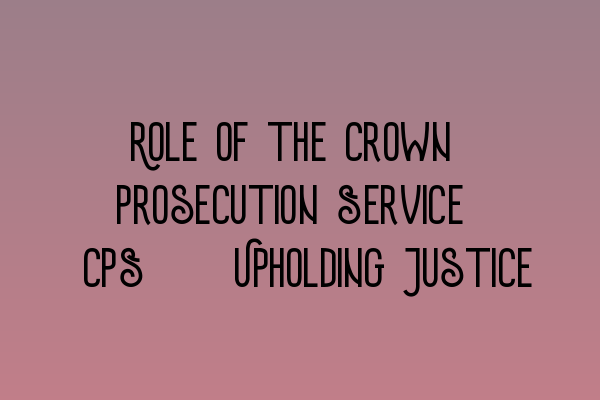Role of the Crown Prosecution Service (CPS): Upholding Justice
The criminal justice system in the United Kingdom relies on various institutions working together to ensure the fair and effective prosecution of individuals accused of committing crimes. One such vital institution is the Crown Prosecution Service (CPS). In this article, we will explore the role of the CPS in upholding justice and its significant impact on the legal landscape.
What is the Crown Prosecution Service (CPS)?
The Crown Prosecution Service is an independent authority responsible for prosecuting criminal cases in England and Wales. It operates independently of the police and other investigative agencies to ensure fairness and impartiality in the pursuit of justice. The CPS plays a crucial role in the criminal justice process by deciding whether to initiate prosecutions, determining charges, and presenting cases in court.
Prosecutorial Decision-Making
One of the primary responsibilities of the CPS is to make decisions regarding prosecutions. This process involves carefully reviewing the evidence gathered by the police or other investigative agencies and assessing whether there is a realistic prospect of conviction. The CPS must consider the public interest, ensuring that cases are pursued only when it is in the best interests of justice.
Prosecutorial decision-making involves a thorough evaluation of the available evidence and legal considerations. The CPS must determine the appropriate charges to be brought and ensure that the evidence supports those charges. This decision-making process ensures that only cases with sufficient evidence proceed to court, preventing malicious prosecutions and safeguarding defendants’ rights.
The CPS and Victims
The CPS plays a vital role in supporting and representing victims of crime. It provides guidance and advice to victims throughout the prosecution process, ensuring their rights are protected and their voices heard. The CPS strives to be sensitive to the needs of victims, offering services such as special measures and support during court proceedings.
By actively engaging with victims and considering their views, the CPS helps maintain public confidence in the criminal justice system. The welfare and well-being of victims are essential considerations as the CPS seeks to uphold justice and achieve fair outcomes.
The CPS and Legal Professionals
The Crown Prosecution Service also collaborates closely with legal professionals, including solicitors and barristers. Together, they work to ensure the effective presentation of cases in court. CPS lawyers provide legal advice and guidance to police officers and other investigators during the early stages of an investigation. They also offer support to external legal professionals who are involved in prosecuting cases.
The Role of the CPS in Upholding Justice
The Crown Prosecution Service plays a fundamental role in upholding justice in the UK’s criminal justice system. By making independent and impartial decisions regarding prosecutions, the CPS ensures the fair treatment of defendants while safeguarding the interests of victims and the public.
The CPS’s commitment to upholding justice goes beyond individual prosecutions. It actively seeks to develop and improve the quality of prosecutions by learning from past cases and sharing knowledge with legal professionals. This dedication to continuous improvement contributes to the overall effectiveness of the criminal justice system.
Conclusion
The Crown Prosecution Service is a vital component of the criminal justice system, ensuring the fair and effective prosecution of criminal cases in England and Wales. Its commitment to upholding justice, providing support to victims, and collaborating with legal professionals contributes to the overall integrity of the legal landscape.
To learn more about the legal profession and preparation for the SQE exams, you may find the following articles helpful:
